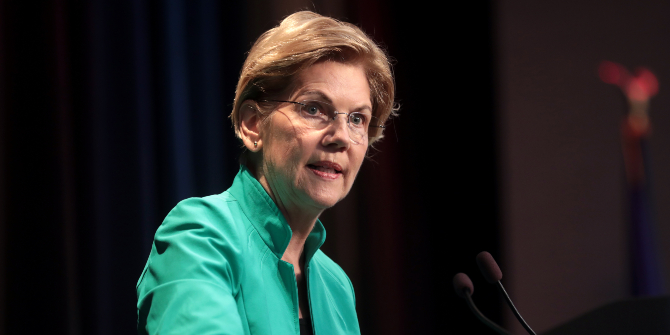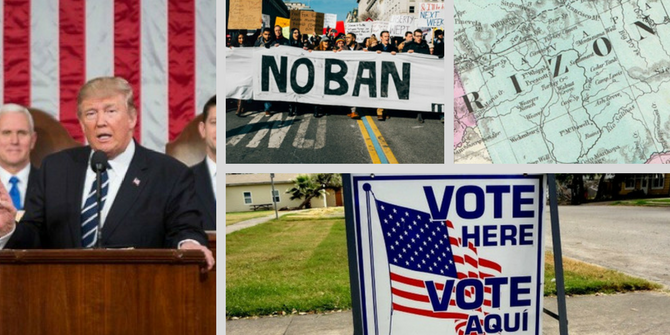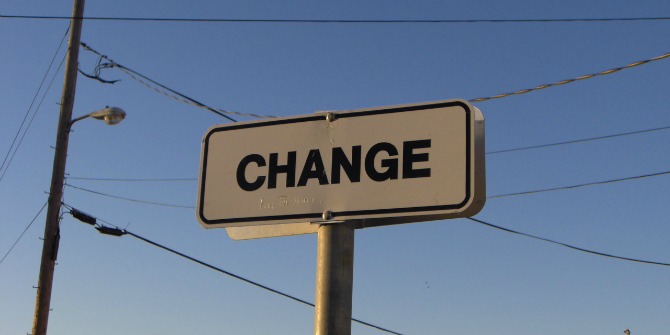 LSE USAPP blog Managing Editor, Chris Gilson, reviews our coverage of the political ups and downs of 2019, month by month.
LSE USAPP blog Managing Editor, Chris Gilson, reviews our coverage of the political ups and downs of 2019, month by month.
January – An end to the longest Government Shutdown
This year began (as 2018 did) with a continuing government shutdown over President Trump’s desire for funding for the construction of a wall at the US’ southern border with Mexico. The shutdown finally ended on January 25th (after becoming the longest in US history), with a continuing resolution to open the government for three weeks. Following the agreement, President Trump tweeted that no concession was made.
February – A delayed State of the Union
After shutdown-related delays, President Trump gave his second State of the Union Address to a joint session of Congress on February 5th. Ahead of the State of the Union John Lovett of Merrimack College warned that that Trump may be wasting his breath; the evidence shows that unpopular presidents often have their agendas largely ignored by Congress.
During his address, Trump promised to end America’s ‘endless wars’ overseas (though in reality, the War in Terror continues unabated), touted bipartisanship, and gave an unsubstantiated warning about immigrant ‘caravans’ coming to the US to cause crime and violence. Patrick A. Stewart of the University of Arkansas commented that Trump’s choice to spotlight mostly white men as ‘heroes’ and women and African Americans as ‘victims’ in his State of the Union guest list shows how his administration views gender and ethnicity in America more widely.
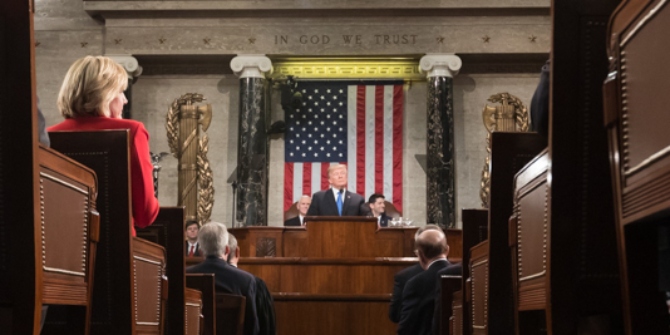
“State of the Union” by The White House is Public Domain.
On February 15th Congress passed a measure to keep the government open into October which would fund the border wall to the tune of $1.4 billion, rather than the $5.7 billion that Trump had wished for originally. With Trump’s border wall ambitions left underfunded, it looked increasingly like he would declare a national emergency to fund it. Thomas Gift of UCL commented that such a move on the President’s part would likely set Trump on the road to impeachment.
February 2019 also marked one year until the 2020 Iowa Caucuses, an occasion we used to launch out Primary Primers series, curated by Rob Ledger (Frankfurt Goethe University) and Peter Finn (Kingston University). Read the whole series here.
In state-related commentary, the 2018 midterms cast a long shadow, with allegations of electoral fraud in North Carolina’s 9th Congressional District leading to hearings in the state capital in February. Mary Jo Shepherd of UNC Charlotte wrote that evidence of fraud in that contest shows just how urgently reform of state election systems is needed.
February also saw Virginia’s Governor, Ralph Northam and Lieutenant Governor, Justin Fairfax embroiled in accusations of historic racism and sexual misconduct, respectively. At the time, Lauren C. Bell of Randolph-Macon College predicted that there was little chance that any of those involved would be removed by their legislative colleagues – a prediction that turned out to be true.
March – Mueller leaves a big question mark over Trump
At the end of February, President Trump did indeed declare a national emergency in order to get his wall constructed. Eric Svensen of Sam Houston State University argued that Trump was well within his rights to do this, with the 1976 National Emergencies Act giving him the authority that he needed from Congress.
One year on from the beginning of President Trump’s trade war with China, Ufuk Akcigit, Sina Ates and Giammario Impullitti wrote that the move to protectionism shows that Trump has learnt the wrong lessons from President Ronald Reagan; policies aimed at promoting innovation are preferable to those that make trade more difficult.
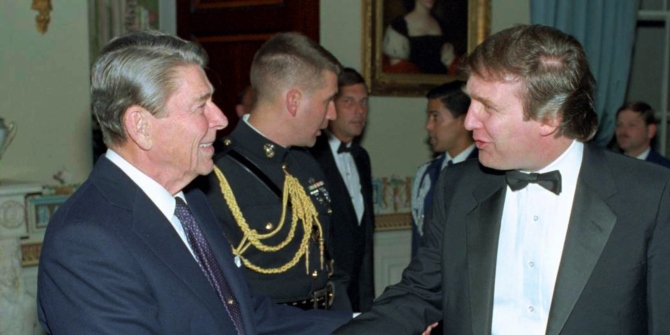
Credit: White House photographer. [Public domain]
Towards the end of the month, Special Counsel Robert Mueller delivered his special report on Russian links to Trump’s 2016 election campaign to the US Attorney General, William Barr. Ahead of the release of the report to the public, US Centre Director, Professor Peter Trubowitz argued that “[b]y not cleanly resolving the question of whether Trump obstructed justice in Trump’s favor, Mueller has left a big question mark hanging over the president’s head”.
April – Maryland’s minimum wage and remembering Martin Luther King Jr,
In early April, Liam C. Malloy and Shanna Pearson-Merkowitz of the University of Rhode Island reflected on the Maryland Legislature’s override of the Governor Larry Hogan’s recent veto of a bill which would increase the state’s minimum wage to $15 per hour. They commented that evidence from other states show that increasing minimum wages has little effect on jobs and leads to more productive employees who are less likely to leave their employers.
Fifty-one years on from the assassination of Civil Rights leader, Martin Luther King Jr, Stewart Smyth University of Sheffield reminded us the events of 1968 took place against the backdrop of a labor dispute between sanitation workers in Memphis, Tennessee and their management, and that that any strategy to create change must have mass movements, including organised labor and strikes, at its heart.
May – State abortion policies and Biden on busing
In the spring, allegations came to light of wealthy parents bribing elite universities to ensure that their children would be able to attend. Comparing this to the sale of the pain reliever OxyContin by the British and American Sackler family Dan Cohen of Concordia University and Emily Rosenman of University of Toronto wrote that the two seemingly unrelated scandals illustrate the influence that philanthropy and social finance have over US policymaking.
In the foreign policy sphere, President Trump labelled Iran’s Islamic Revolutionary Guard as a terrorist group. Younes Mahmoudieh of the University of California Los Angeles argued that the move highlighted Trump – and the US’ – unfamiliarity with Iranian politics and society.
Back on state politics, Alex Keena of Virginia Commonwealth University looked at the recent trend in conservative-leaning states to pass far-reaching bills aimed at restricting abortion. He commented that such measures were unlikely to reduce the number of women who get abortions, as women will simply seek them elsewhere, self-induce or seek unsafe procedures.
As the year progressed, the Democratic race for the party’s presidential nomination continued to heat up. Richard Johnson of Lancaster University unpacked the reputation on school busing of former Vice-President Joe Biden, writing that Biden had vowed to eliminate the practice in the 1970s but that its effectiveness had been proven by the 1980s.
Have most weeks in Trump’s presidency been infrastructure week? One week in late May most definitely was not, with President Trump walking out of an infrastructure-related meeting with Congressional Democrats. Juita-Elena (Wie) Yusuf of Old Dominion University argued that even though the President’s plan was dead on arrival, it would have in fact done little to solve the fundamental problems with the country’s infrastructure problems.
June – Trump in the UK and SCOTUS declines to rule on gerrymandering
Mid-year saw Joe Biden rise to the top of presidential primary polls; as part of our Primary Primers series, Ronald Ranta of Kingston University warned us that Biden’s poll lead may mask a fragile position, with other candidates who had more enthusiastic support waiting in the wings to take the former Vice-President’s lead.
Early June saw President Trump’s long-awaited state visit to the United Kingdom. US Centre Director, Professor Peter Trubowitz, commented at the time that the President’s visit was timed very well to take the American public’s attention away from problems at home such as the growing calls for impeachment and Congressional inaction over his agenda.

“President Trump Land at Winfield House” by The White House is Public Domain“
Speaking of Congress, this year saw growing calls from left-leaning Democrats for a Green New Deal to tackle climate change. Daniel Yuichi Kono of the University of California, Davis recommended that packaging such legislation with policies to help workers would make it more likely to pass.
At the end of June, the US Supreme Court declined to review state-based partisan gerrymandering cases. Reviewing the outcome, Alex Keena, Michael Latner, Anthony J. McGann and Charles Anthony Smith argued that the decision effectively removed Americans’ fundamental right to participate equally in the political process
July and August – Iran intervention, reflecting on border policies and Greenland
One of President Trump’s most distinctive behaviors is his use of Twitter to pursue his own political goals. Following Trump’s tweets that four House Democratic women of color should “go back to where you came from”, Jamil Scott of Georgetown University wrote that Trump’s racially coded language has activated racial prejudice among his followers without even explicitly mentioning race.
Another feature of 2019 was Trump’s increasing pressure on Iran over that country’s nuclear program. Christian Emery of the University of Plymouth commented that President Trump’s ability to harm the Iranian economy through sanctions illustrates that American power is going nowhere. Shortly thereafter, Alexander Soderholm of the LSE US Centre’s International Drug Policy Unit argued that a US military intervention in Iran would be a grave mistake, given experience with similar actions in Iraq and Afghanistan.
Still on US foreign policy, you may recall that in August President Trump floated the idea that the US might purchase Greenland from Denmark. At the time, Ulrik Pram Gad of Aalborg University, Denmark, commented that Trump’s Greenland designs shows that the president’s slow dismantling of the US-led liberal world order has now also become the problem of smaller nations.
By 2019, we’d seen two years of heavy-handed border enforcement policies from the Trump administration. And while these policies tend to be associated with the US-Mexico border, Emily Gilbert of the University of Toronto drew attention to the elasticity of the US-Canada border which sees shifting jurisdictions and enforcement authority. Also, writing on US-border politics, Jill M. Williams of the University of Arizona reported on her new research which found that public information campaigns to dissuade potential migrants rely on the wide distribution of emotive imagery to encourage potential migrants to question whether the benefits of making the journey are worth the potential costs.
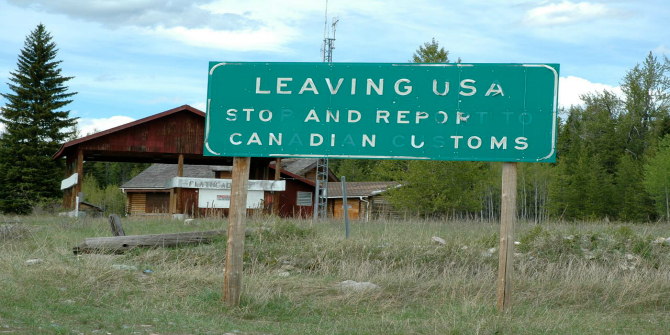
“Abandoned border” by mtsrs is licensed under CC BY 2.0
Through the summer, several potential challengers for the Republican presidential nomination appeared such as former Massachusetts Governor Bill Weld and former Congressman Joe Walsh. Commenting on these challengers, Wayne Steger of DePaul University wrote that a challenge to Trump would be very likely to fail, but it would tell us a great deal about whether he would be likely to win election in 2020.
September – A toothless FEC and an impeachment inquiry
Following the resignation of the vice chairman of the Federal Election Commission (FEC) at the end of August the country’s election oversight body was left essentially powerless, wrote Melissa M. Smith of Mississippi University for Women. Smith argued that given President Trump’s seeming lack of interest in naming replacement commissioners, the FEC would likely remain being a paper tiger for the foreseeable future.
September also saw the third Democratic debate of the primary campaign; I previewed the debate with profiles for each of the ten qualifying candidates. Read what I thought then about the state of the Democratic race, here.
The month was rounded out by US House Speaker Nancy Pelosi’s announcement that House Democrats would be launching a formal impeachment inquiry against Donald Trump, following allegations that he pressured the President of Ukraine to investigate potential Joe Biden. US Centre Director, Professor Peter Trubowitz, looked at why Speaker Pelosi had finally called for an impeachment inquiry, and at what the next steps might be.
October – Record low refugee cap and Virginia elections
At the end of September, President Trump announced that the cap for the number of refugees which would be admitted into the US for 2020 would be 18,000 – the lowest number ever. Shyam K. Sriram of Butler University wrote that this new low cap was a significant departure for a Republican president who in the past admitted over 100,000 per year, in the case of George HW Bush.
As the House Democrats’ impeachment inquiry began, Thomas Gift of UCL commented that the Democrats would have to stay on message and act swiftly so that the American public will not lose interest in the proceedings.
While 2019 was not a federal election year, there were still important state-wide contests, including in Virginia. Ahead of the Old Dominion State’s General Assembly elections, Lauren C. Bell of Randolph-Macon College argued that the Democratic Party had a good chance of retaking the body given its greater candidate recruitment, and the growing dislike of President Trump in Virginia.

“Virginia Capitol Building” by Stephen Mahoney is licensed under CC BY NC SA 2.0
As mentioned above, President Trump is well known for attacking those he sees as inimical to his agenda on Twitter. In research we highlighted in October, Scott Hofer of St. Francis College (New York) and Jason Casellas of the University of Houston found that while Trump has often criticized Latino judges, they are some of the most conservative jurists on the federal bench.
Swinging back to the 2020 Democratic presidential primary, Dan Cassino of Fairleigh Dickinson University presented new research based on survey data which finds that across all age groups, respondents tended to prefer younger candidates to older ones, with those between 40 and 50 especially favored.
October also saw Stephen M. Walt, Robert and Renée Belfer Professor of International Affairs at the Harvard Kennedy School of Government visit the LSE for his lecture, “Can America Still Have a Successful Foreign Policy?”. You can listen to the event podcast and read LSE International Relations student Charles Dunst’s review of the event, here.
November – Bye bye Bevin and impeachment rolls forward
Kentucky also saw state-wide elections this November, with Democrat Andy Beshear beating the incumbent Republican Matt Bevin. Anne Cizmar of Eastern Kentucky University suggested that we should not take too many lessons for the national stage from the Republican defeat. Bevin’s loss, she argued, can mostly be attributed to his own unpopularity and poor governing strategies rather than a new wave against the Republican Party
The already crowded Democratic presidential field became even more so in November, with former New York Mayor, Michael Bloomberg joining the race. Commenting on the move, UCL’s Thomas Gift wrote, “his road to victory will require navigating an already crowded field, including a surging Warren. He also risks splitting the moderate vote with Biden”.
The Democrats moved through their impeachment inquiry through November, with a vote to impeach President Trump looking increasingly likely to pass as December approached. Scott Fischer and Elizabeth Freund Larus of the University of Mary Washington argued that when the proceedings move to a Senate trial, conviction would likely be an uphill battle given Washington DC’s current partisanship.
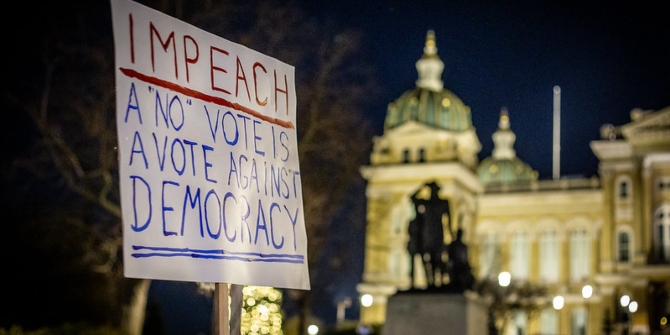
“Impeachment Rally” by Phil Roeder is licensed under CC BY 2.0
Nearly three years into his presidency, is Donald Trump undermining American democracy? No, wrote Hadas Aron of New York University and Emily Holland of the United States Naval Academy. The ongoing impeachment hearings and the robustness of the Supreme Court illustrate the resilience of US institutions, they argue. The real threats to democracy in America, such as mass incarceration, political polarization, and inequality, are much more systemic and long term.
December – Impeachment passes and thinking about inequality
This year saw the rise of the Extinction Rebellion movement which pushed action on the climate emergency through direct action. New research from Benjamin Farrer of Knox College and Graig R Klein of New Jersey City University finds that forceful environmental protests are often not seen as terrorism by voters, and that they can be looked upon sympathetically when they are used as tactics of last resort.
With the first Iowa caucuses now less than two months away, the focus on the Democratic 2020 election primary contest continued to intensify. Kal Munis, Richard Burke, Nicole Huffman, and Connor Munis looked at how voters’ populist attitudes affect how they feel about the Democratic candidates. They find that those who maintain that “the people” should have a direct say in government’s decisions were more likely to support Sanders or Warren, while those who feel that the “ordinary person” is the most virtuous favored former Vice President Joe Biden. Also on the Democratic primary, following the withdrawal of California Senator, Kamala Harris, from the race, Andreu Casas, Ericka Menchen-Trevino, Miriam Boon and Magdalena Wojcieszak investigate who her supporters are likely to vote for. Using new survey data, they find that The Daily Beast may have an important say as to which candidate benefits the most.
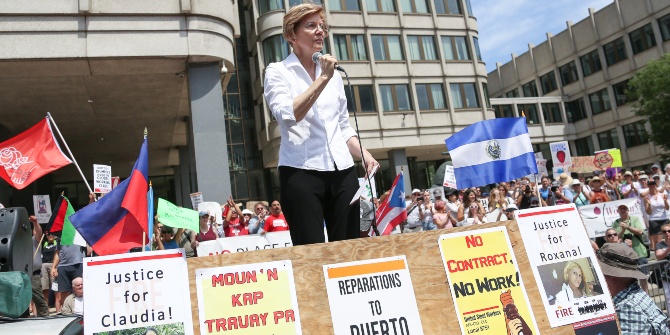
“Family Reunification Rally – Boston, MA” by Elizabeth Warren is licensed under CC BY SA 2.0
On December 18th, Donald Trump became only the third president to be impeached by the US House of Representatives. As preparations for his Senate trial – likely to be held in January – began, Jeffrey K. Tulis of the University of Texas at Austin made the case for the Senate as Impeachment Court to not be the partisan Senate as usual. Also writing on the upcoming Senate trial, US Centre Director, Professor Peter Trubowitz commented that despite President Trump’s seeming desire for a long, drawn-out trial with many witnesses, Senate Republicans may want to get things over with quickly, with little evidence taking.
A major platform for Democratic presidential candidates like Senators Bernie Sanders and Elizabeth Warren has been addressing the widening inequality between the top 1 percent of income earners and the rest of society. In a recent article, Andy Summers of the LSE’s Department of Law responded to recent research which suggests a new way to measure incomes, which may then change what we know about inequality. He argued that everything that we previously knew about economic inequality isn’t wrong; it simply shows that how we think about inequality is still subject to debate.
Please read our comments policy before commenting.
Note: This article gives the views of the authors, and not the position of USAPP – American Politics and Policy, nor the London School of Economics.
Shortened URL for this post: http://bit.ly/2SBovqd
About the author
 Chris Gilson – LSE US Centre
Chris Gilson – LSE US Centre
Chris Gilson is the Managing Editor of USAPP, the US Centre’s daily blog on US politics and policy. He was previously Managing Editor of the LSE’s British Politics and Policy blog , and of EUROPP– the LSE’s European Politics and Policy blog, both for the LSE’s Public Policy Group. In 2012, Chris was the recipient of a UK Times Higher Education Leadership and Management Award for Knowledge Exchange/Transfer Initiative of the Year for the LSE’s blog initiatives. He is the co-author, with Amy Mollett, Cheryl Brumley, and Sierra Williams, of Communicating Your Research with Social Media: A Practical Guide to Using Blogs, Podcasts, Data Visualisations and Video (Sage, 2017). He has a undergraduate and a Masters degree in Geography, and a postgraduate diploma in Strategic Management, all from the University of Waikato, Hamilton, New Zealand.


